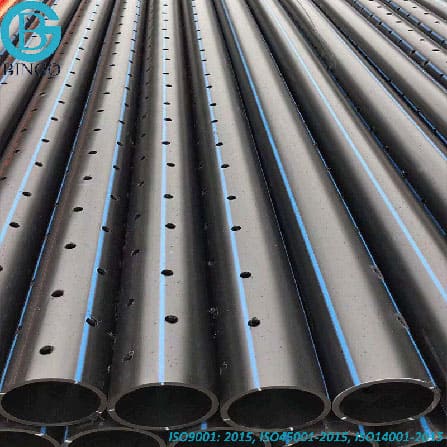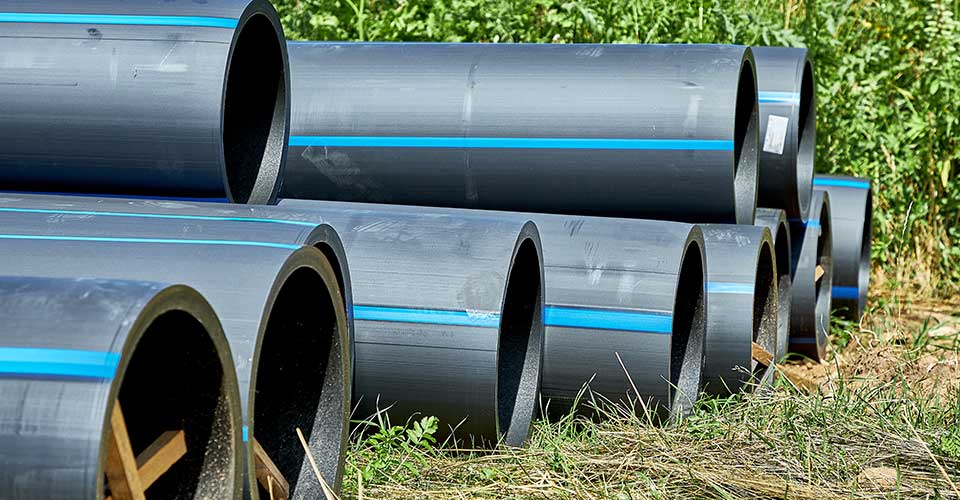Exploring American Plastics HDPE Pipe Manufacturing and Its Role in Modern Infrastructure
Wiki Article
A Comprehensive Guide to the Various Usages of HDPE Pipe in Building And Construction and Industry
HDPE pipes have arised as a critical element in contemporary building and commercial applications. Their special residential properties, such as resistance to deterioration and light-weight layout, make them appropriate for a vast array of usages. From water systems to farming watering, HDPE pipes provide services that boost efficiency and sustainability. Comprehending their diverse applications is crucial for experts aiming to maximize framework. What certain benefits do these pipelines bring to each sector?Water and Distribution Equipments
Supply of water and distribution systems are essential components of urban infrastructure, often counting on high-density polyethylene (HDPE) pipelines for their sturdiness and efficiency. These systems transport safe and clean water from treatment facilities to consumers, making sure accessibility and security. HDPE pipes are favored for their resistance to corrosion, chemicals, and extreme temperature levels, which boosts their long life and lowers upkeep prices. Furthermore, their light-weight nature enables easier setup and transport, making them perfect for different urban and rural applications.The adaptability of HDPE pipelines enables them to be installed in tight rooms and around challenges, minimizing the requirement for substantial excavation (Texas hdpe pipe manufacturer). Additionally, their smooth interior surface minimizes rubbing losses, improving water flow prices. As cities remain to expand, the demand for reliable supply of water systems boosts, positioning HDPE pipes as a sustainable option for modern-day infrastructure jobs. Their tried and tested record makes them a favored option amongst designers and city organizers alike
Wastewater Management and Treatment
Effective wastewater administration and treatment are important for preserving public health and wellness and ecological high quality. HDPE pipelines play a vital role in this process due to their toughness, resistance to rust, and capacity to stand up to rough chemicals. These pipelines are typically used in numerous applications, consisting of sewer system, stormwater water drainage, and wastewater therapy facilities. Their lightweight nature helps with much easier installment and transport, minimizing labor expenses and time.Furthermore, HDPE pipelines have a smooth indoor surface that decreases rubbing loss, promoting effective circulation rates. They are also less prone to leakages and failings compared to traditional products, making sure that contaminants are had successfully. Their versatility permits for versatility in numerous dirt conditions, making them appropriate for diverse ecological setups. As industries significantly prioritize sustainable methods, making use of HDPE pipelines in wastewater monitoring systems aligns with goals for decreasing ecological effect and improving source recovery.
Agricultural Watering Solutions
In agricultural setups, effective irrigation services are necessary for optimizing crop yields and taking care of water sources. HDPE (High-Density Polyethylene) pipes play an essential duty in modern watering systems because of their durability, flexibility, and resistance to deterioration. Their ability to hold up against high stress makes them excellent for both surface area and subsurface irrigation applications, guaranteeing consistent water circulation across areas.Farmers can use HDPE pipes in drip irrigation systems, which supply water straight to plant origins, minimizing wastefulness and advertising healthy and balanced growth. Furthermore, these pipes are lightweight and easy to mount, minimizing labor expenses and installation time. Their lengthy life expectancy and low upkeep needs further enhance their allure in agricultural techniques.
HDPE pipelines are environmentally friendly, as they can be reused and do not leach dangerous chemicals into the dirt. This makes them a lasting option for farmers intending to take on eco-friendly farming techniques while maximizing productivity.
Industrial Applications and Processes
Versatility is a trademark of HDPE pipes, making them important in numerous industrial applications and processes. These pipelines are extensively utilized in chemical handling markets due to their superb resistance to a wide array of harsh substances. HDPE's light-weight nature, incorporated with high tensile strength, enables easy installation and long-term performance in requiring environments.In the oil and gas market, HDPE pipelines play a vital role in transporting hydrocarbons and gases, many thanks to their longevity gas pipeline installation and versatility - American Plastics HDPE Pipe for Oilfield. Additionally, they are utilized in mining operations for the transport of slurry and other products, where conventional piping systems might stop working
HDPE pipes are progressively made use of in manufacturing facilities for water supply lines and wastewater administration. Their ability to withstand extreme temperature visit site levels and stress makes them ideal for a selection of commercial processes. Overall, HDPE pipelines add significantly to performance and safety throughout diverse industrial applications.
Stormwater Administration and Water Drainage Systems
Stormwater monitoring and drainage systems are important components in city facilities, created to take care of excess rains and reduce flooding threats. High-density polyethylene (HDPE) pipelines are significantly utilized in these systems because of their sturdiness, versatility, and resistance to deterioration. These pipelines successfully transfer stormwater away from populated locations, minimizing surface overflow and avoiding waterlogging.HDPE's lightweight nature helps with much easier installment, reducing labor prices and construction time. In addition, its resistance to chemicals and environmental stressors guarantees durability and integrity in various environments. In enhancement to conventional drainage applications, HDPE pipes are likewise used in ingenious options such as eco-friendly framework, which includes rain gardens and absorptive pavements.

Often Asked Inquiries
Exactly How Does HDPE Pipeline Contrast to PVC Pipe in Price?
Generally, HDPE pipe often tends to be a lot more pricey than PVC pipeline as a result of its boosted sturdiness and flexibility. Nonetheless, long-lasting expense a knockout post considerations, such as maintenance and life expectancy, might prefer HDPE in specific applications.
What Is the Lifespan of HDPE Water Lines Under Numerous Problems?
HDPE pipes usually have a lifespan of 50 to 100 years, depending upon ecological conditions, setup practices, and usage. Elements such as temperature, soil type, and exposure to chemicals can significantly influence their longevity.Can HDPE Water Lines Be Recycled After Use?
Yes, HDPE pipes can be recycled after usage. The reusing procedure involves melting down the product, permitting it to be repurposed right into brand-new products, thereby promoting sustainability and lowering ecological influence related to plastic waste.Exist Any Kind Of Specific Installment Obstacles With HDPE Pipes?
Installation difficulties with HDPE pipelines include appropriate jointing strategies, making certain appropriate trench conditions, and handling thermal development. Furthermore, proficient labor is called for to deal with specialized tools, which can make complex the installment procedure in different atmospheres.
What Accreditations Should I Seek When Getting HDPE Water Lines?
When purchasing HDPE pipelines, one must look for qualifications such as ASTM, AASHTO, and ISO, which confirm high quality and compliance with sector requirements, guaranteeing resilience and performance in numerous applications. - American Plastics HDPE Pipe for OilfieldReport this wiki page